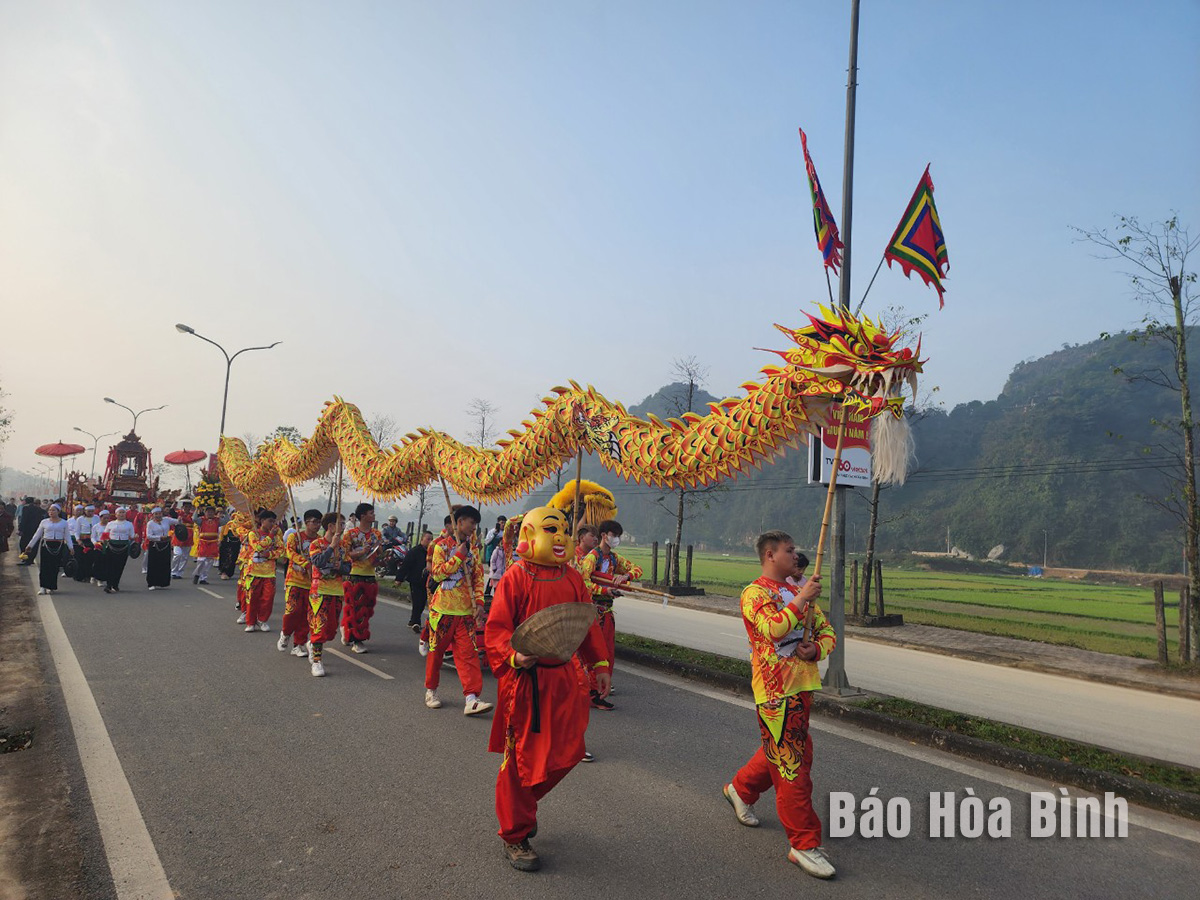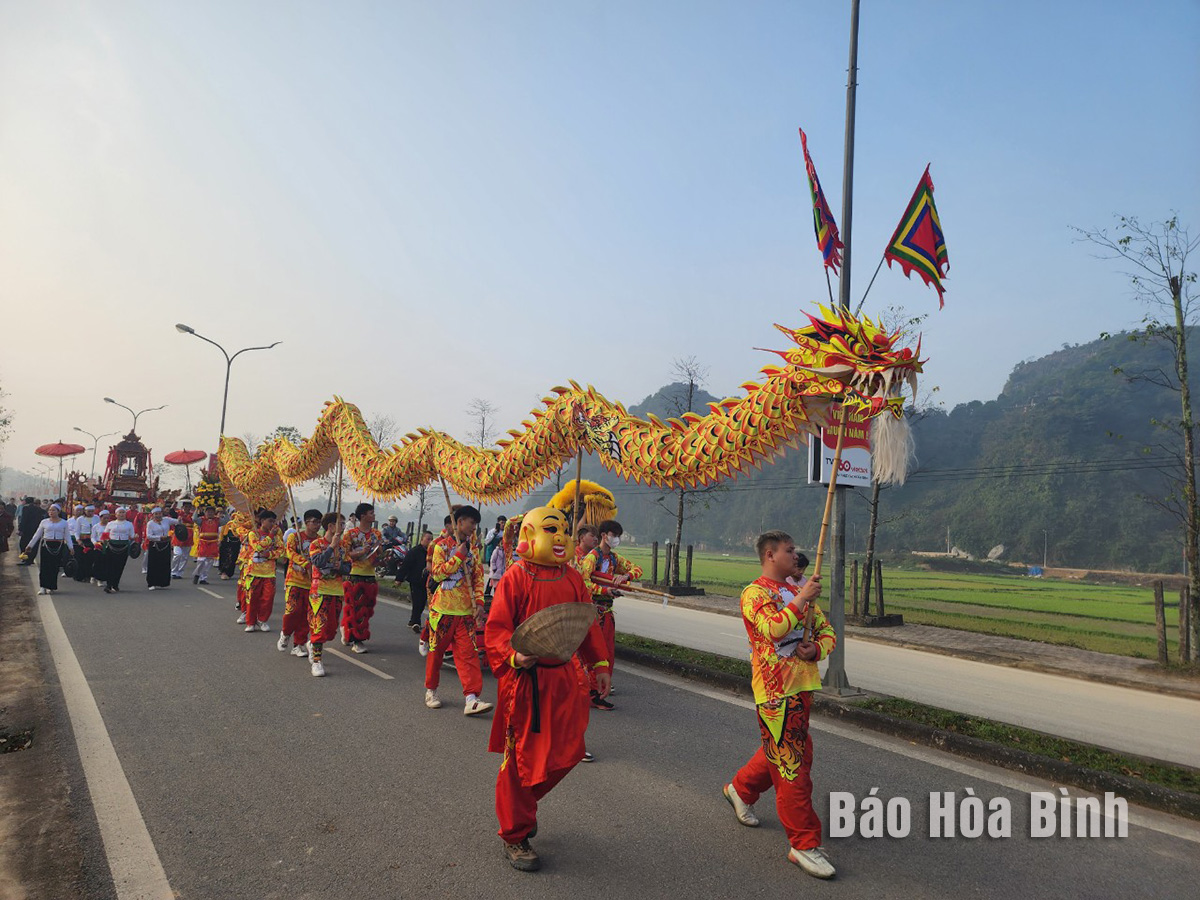
Hoa Binh province has paid due attention to preserving and managing local cultural relic sites in tandem with branching out tourism, contributing to the socio-economic development.
Chua Tien (Tien pagoda) festival in Lac Thuy district is
organised annually to preserve and promote the values of the relic complex.
Notable preservation efforts have been seen in
the Chua Tien landscape and relic complex, which boasts untouched beauty with
magical stalactite caves.
According to Vice Chairman of the Lac Thuy
district People’s Committee Nguyen Ngoc Van, the Chua Tien (Tien pagoda) scenic
spot and relic complex has 21 relics, including historical, cultural,
archaeological ones and landscapes. Outstanding caves such as Mau Long, Tam Hoa
and Tien have lured many visitors.
The construction of Huong Binh cable line,
connecting the pagoda with the Huong pagoda complex in My Duc district, Hanoi,
which is underway, will open up a new direction for local tourism development,
he said, adding the Tien pagoda festival was organised at the provincial level
in 2024, meeting local residents’ needs for cultural and religious activities,
and helping introduce ethnic cultural heritage and bolster local tourism
development.
Deputy Director of the provincial Department of
Culture, Sports and Tuorism Luu Huy Linh said that local relics and scenic
spots have been well managed and renovated, with 293 historical-cultural relic
sites in the province’s list of protected ones, and 112 classified as national
relic sites (41) and provincial-level sites (71).
Several historical-cultural relics have become
not only tourist attractions but also destinations for revolutionary education
such as Muong Khoi war zone, an archaeological site in Trai hamlet, Thach Yen
revolutionary base, and Dau Rong cave scenic complex, he said.
However, he pointed out several challenges to
the management of local relic sites, including limited awareness of several
party committees and administrations, a shortage of capital for restoration and
renovation work, as well as low efficiency of the communications work.
With a view to effectively carrying out the
province’s policy to create a breakthrough in development through preserving
and promoting the values of ethnic culture, improving the efficacy of the state
management and mobilising resources for the renovation work, the standing board
of the provincial Party Committee issued a directive dated June 28, ordering
enhanced communications work on related documents and policies.
According to Linh, departments, branches,
sectors and the People’s Committees of districts and Hoa Binh city must step up
state management over local historical-cultural relic sites, allocate budget
for and build mechanisms and policies to mobilise resources for the restoration
work, and focus on the study and popularisation of the values of relic sites
belonging to the "Hoa Binh Culture”. He also noted the need to study the
application of science technology in the preservation and promotion work, and
develop high-quality human resources in the area.
With an increasingly vibrant and widespread emulation movement aimed at building cultured residential areas and cultured families, Yen Thuy District has been making steady progress toward improving both the material and spiritual well-being of its people, while fostering a civilized, prosperous, beautiful, and progressive community.
Once lacking recreational spaces and community facilities, Residential Group 2 in Quynh Lam Ward (Hoa Binh City) has recently received attention for the construction of a new, spacious, and fully equipped cultural house. The project followed the model of state support combined with public contributions in both labor and funding.
The "All people unite to build cultural life" movement, which has been effectively integrated with Kim Boi district’s socio-economic development goals, is fostering a lively spirit of emulation across local residential areas, hamlets, villages, public agencies, and enterprises. In addition, through the initiative, traditional cultural values are being preserved and promoted, while community solidarity and mutual support in poverty reduction and economic development are being strengthened.
A working delegation of the Hoa Binh provincial People’s Committee led by its Permanent Vice Chairman Nguyen Van Toan on June 11 inspected the progress of a project to build the Mo Muong Cultural Heritage Conservation Space linked to tourism services in Hop Phong commune, Cao Phong district.
Born and growing in the heroic land of Muong Dong, Dinh Thi Kieu Dung, a resident in Bo town of Kim Boi district, in her childhood was nurtured by the sweet lullabies of her grandmother and mother. These melodies deeply imprinted on her soul, becoming an inseparable part of her love for her ethnic group's culture. For over 20 years, this love for her hometown has driven Dung to research, collect, and pass down the cultural values of the Muong people to future generations.
In the final days of May, the Ethnic Art Troupe of Hoa Binh Province organized performances to serve the people in remote, mountainous, and particularly disadvantaged areas within the province. These were not just ordinary artistic shows, but they were the meaningful journeys aimed at spreading cultural values, enhancing the spiritual life of the people and contributing to the preservation of ethnic minority cultural identities.



